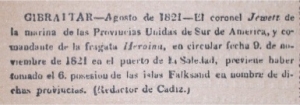British pamphlets and recent Op-Ed’s published in dubious news sources show that UK propaganda campaign has reached alarming levels: UK now distorts historical facts and documents already acquiesced by the British government.
After the 1810 May Revolution, the United Provinces of the River Plate carried out acts demonstrating the effective exercise of sovereignty over the Malvinas. As an example, there is correspondence of José de San Martín, who in 1816 requested prisoners in Patagones and Malvinas to be sent to the capital of the United Provinces.
The act of possession of the islands exercised in 1820 by Colonel David Jewett on behalf of Argentina, then United Provinces of the River Plate, is another example of paramount significance. So much so that it became another target of British propaganda in its attempt to distort reality and historical truth.
Early in 1820, Colonel David Jewett, Naval officer officially appointed by the Government of the United Provinces of the River Plate was sent to take possession of the Malvinas. Whalers and fishermen from different countries participated at the event.
This fact was widely reflected in international newspapers of that time in a “Circular” that informed the world of this official taking of possession of the islands “in the name of the Supreme Government of the United Provinces of South America”.
Not only “The Times” of London published this Circular on 3 August 1821 but also “El Redactor” of Cádiz, Spain,and the Salem Gazzette. UK remained silent and never protested this sovereign act.
The Argentine government took several actions in support of its sovereignty over the islands, including the appointment of governors, the enactment of legislation on fisheries and granting international concessions. These facts seem to go unseen for British propaganda.
As well as the fact that in 1825, Great Britain recognized Argentina as a sovereign state and made no reservation regarding Argentina’s exercise of sovereignty over the Malvinas Islands, which was then not only peaceful but public.
It is only now that British propaganda seeks to deny the very existence of the “Circular” published in The Times and accuses Argentina of a stunt. Any sensible interested human being can confirm the authenticity of this fact by consulting the archives of The Times of 3 August 1821 to find the Circular that was published and never protested by the UK.
The “Circular” appears in the right lower corner of the paper broad sheet (The Times, London, Friday, August 3, 1821). If the “Circular” was later reproduced out of its original format does not diminish the vital importance of this fact nor its authenticity. Any claim to the contrary is simply untrue.












Recent Comments